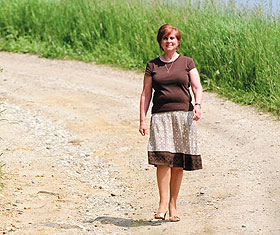  |
| HOME | THIS ISSUE | CALENDAR | GRANTS | BACK ISSUES | < BACK | NEXT > |
Study examines impact of eating raisins on cardiovascular healthby Colin Poitras - June 8, 2009
|
||||
| Eating a cup of raisins and walking extra steps daily may help reduce the risk for cardiovascular disease in men and women between the ages of 50 and 70, according to a recent study by researchers in the Department of Nutritional Sciences. In a study published in the journal Metabolism: Clinical and Experimental, researchers found that eating one cup of raisins a day and walking regularly as exercise helps reduce hunger and significantly decreases levels of low density lipoproteins (LDL) cholesterol – the so-called ‘bad cholesterol’ – in the blood stream. The research was funded by the California Raisin Marketing Board. “Our research indicates that easily implemented lifestyle changes such as increasing raisin consumption or walking additional steps each day may help decrease the risk for heart disease,” says Maria Luz Fernandez, a professor of nutritional sciences in the College of Agriculture and Natural Resources and the study’s principal investigator. Cardiovascular disease is the leading cause of death for both men and women in the United States. Eating raisins helps decrease the risk of cardiovascular disease because raisins contain dietary fiber known to lower LDL cholesterol. One cup of raisins provides an additional 10 g of dietary fiber and approximately 3 g of soluble fiber to a person’s diet. Raisins also are a significant source of polyphenols, which may interfere with cholesterol absorption. One cup of raisins contains approximately 850 mg of polyphenols. Overall, the researchers found that consuming raisins, walking, or doing a combination of these will alter lipoprotein metabolism and may thereby reduce the risk for cardiovascular disease in older men and women. Raisins particularly, as a source of soluble fiber, were shown to reduce hunger and could help individuals reduce their caloric intake by altering the hormones that indicate when the body is satiated. In the study, 34 subjects – 17 men and 17 postmenopausal women – between the ages of 50 and 70 were matched by weight and sex and then randomly assigned to consume one cup of raisins a day, increase the amount of steps walked each day, or both.
The subjects completed a two-week preparatory period followed by a six-week intervention. Those participating in the walking regime were asked to increase their steps walked by an additional 10 minutes a day above their normal activity every two weeks, in order to increase their walking by approximately one kilometer every two weeks. Tests at the end of the study showed that systolic blood pressure was reduced for all subjects. Plasma total cholesterol decreased by 9.4 percent for all subjects, which the researchers believe was caused primarily by a 13.7 percent reduction in plasma LDL or bad cholesterol. Plasma triglycerides concentrations decreased by 19.5 percent for those who walked additional steps. “This study builds upon previous research demonstrating raisins’ cholesterol-lowering and heart health benefits due to their fiber and antioxidant content,” says Julie Miller Jones, national scientific advisor to the California Raisin Marketing Board. Jeff Volek, a registered dietician and associate professor of kinesiology in the Neag School of Education, and one of his former students, Cherise Labonte, also participated in the research. One of Fernandez’ former doctoral students, Michael Puglisi, now a post-doctoral fellow at Vanderbilt University, wrote the published report. Two recent Ph.D. graduates – Gisella Mutungi from Fernandez’ laboratory, and Pierre Brun, who works in the nutritional sciences laboratory of associate professor Mary McGrane – also participated. McGrane, and Richard Wood, a former Ph.D. student under Fernandez who is now an assistant professor of exercise science at Springfield College, completed the research team. |
| ADVANCE HOME UCONN HOME |

